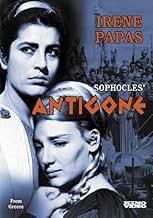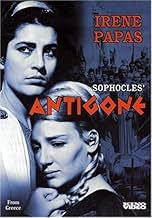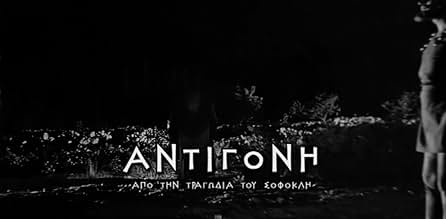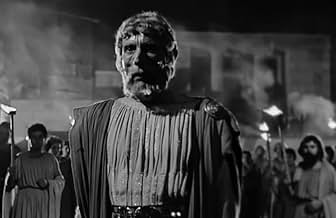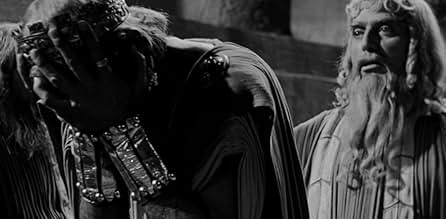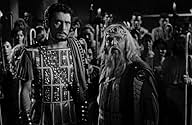Antígona desafia o decreto do seu tio, que seu irmão traidor não deveria ser enterrado, portanto, não encontraria descanso na vida após a morte. Suas ações tem consequências trágicas.Antígona desafia o decreto do seu tio, que seu irmão traidor não deveria ser enterrado, portanto, não encontraria descanso na vida após a morte. Suas ações tem consequências trágicas.Antígona desafia o decreto do seu tio, que seu irmão traidor não deveria ser enterrado, portanto, não encontraria descanso na vida após a morte. Suas ações tem consequências trágicas.
- Direção
- Roteiristas
- Artistas
- Prêmios
- 3 vitórias e 1 indicação no total
Yorgos Karetas
- Elder of Thebes
- (as Giorgos Karetas)
Mimis Rougeris
- Elder of Thebes
- (as Dimitris Rougeris)
- Direção
- Roteiristas
- Elenco e equipe completos
- Produção, bilheteria e muito mais no IMDbPro
Avaliações em destaque
Most people who watch this film will be doing it in order to see an example of a classic Greek tragedy. They will be satisfied. It is dignified, stately, and absolutely dripping with fate, destiny, and tragedy.
But what if you are more like an average movie-goer? Does it hold up under more normal criteria? I think it does to some extent, but not particularly well. The plot is started at the very beginning of the opening scene as Antigone expresses her determination to bury her dead brother, and everything else follows inevitably - the entire story is plot-driven. It's a rather simple plot, but it does carry you along. I'm not sure there's a lot more that's really compelling about the film. It's pretty stagey, with actors and extras forming nice patterns, as if lining up with chalk lines on the floor. Although there are a number of small processions and such, this is not a costume epic with a cast of thousands and crane shots filling the screen with colourful eye candy. It's filmed in black and white. Is the acting good? Sure, but bear in mind that the range of emotions is quite limited, and characters pretty much talk in set speeches. They do imbue their dignified speeches with the correct emotions and make them sound sincere.
But, to be honest, I don't think you would recommend this film to anyone unless they had a pre-existing interest in classical Greek drama.
But what if you are more like an average movie-goer? Does it hold up under more normal criteria? I think it does to some extent, but not particularly well. The plot is started at the very beginning of the opening scene as Antigone expresses her determination to bury her dead brother, and everything else follows inevitably - the entire story is plot-driven. It's a rather simple plot, but it does carry you along. I'm not sure there's a lot more that's really compelling about the film. It's pretty stagey, with actors and extras forming nice patterns, as if lining up with chalk lines on the floor. Although there are a number of small processions and such, this is not a costume epic with a cast of thousands and crane shots filling the screen with colourful eye candy. It's filmed in black and white. Is the acting good? Sure, but bear in mind that the range of emotions is quite limited, and characters pretty much talk in set speeches. They do imbue their dignified speeches with the correct emotions and make them sound sincere.
But, to be honest, I don't think you would recommend this film to anyone unless they had a pre-existing interest in classical Greek drama.
It is true the more knowledge of the play by Sophocles and of Greek plays, in general, the more you can appreciate this rendition. However, the interesting thing about this presentation is you can start from ground zero and come away with everything the tragedy is about. Even though the story is well known, I will not go through it in case this is your first time.
There is an introduction to bring you up to date from Oedipus through his descendants and history to today where you meet Antigone and her sister Ismene. Their decisions are partially ordained and those of the new king Creon decide the outcome. You may find yourself quoting this play as you would Shakespeare's plays.
The reason for watching it multiple times is the first time around you may be busy reading the subtitles of which some flash and are gone. The second time around you may keep an eye on the acting. Third, you will get used to the Greek and even if you do not speak it, you will find much filled in that was not subtitled. By now you will be hooked and have to watch it periodically.
There is an introduction to bring you up to date from Oedipus through his descendants and history to today where you meet Antigone and her sister Ismene. Their decisions are partially ordained and those of the new king Creon decide the outcome. You may find yourself quoting this play as you would Shakespeare's plays.
The reason for watching it multiple times is the first time around you may be busy reading the subtitles of which some flash and are gone. The second time around you may keep an eye on the acting. Third, you will get used to the Greek and even if you do not speak it, you will find much filled in that was not subtitled. By now you will be hooked and have to watch it periodically.
Moral claims do not give rise to philosophical grounds. Yet, In Antigone it is clear that moral actions prompt philosophical questions, and inherently make good drama.
This review acts as a strict focus on how moral and ethical points are made throughout the film, and how they act as catalysts to progress the story and keep the viewer involved. Be it known that I have not read the Sopheclean text of Antigone, and fully derive all of my comments and criticisms solely within the boundaries of the film.
The character flaws present in the film mostly derive from wayward and distorted adherences to moral ideologies. For example, Antigone's ethical and moral backbone throughout the film is guided by powerful intangibles like love and loneliness, which makes her rash and at times misguided. Creon's moral code is also in knots as he acts as a Euthyphro in the fact that he is conflicted and contradictory to many of his beliefs that shape him, i.e. his aforementioned moral code.
Values undoubtedly shaped the society of Ancient Greece. Loyalty was a cornerstone value in this society, yet loyalty drifts and fades as tides turn in Antigone. For example, as Creon is crowned King of Thebes he is shown immediate support as the new benevolent King, yet mourning for Oedipus, or any mention of him whatsoever is non existent. Is this a loyal Thebes? Though support of Creon was warranted by his grace, the remembrances of a fallen king laid flat.
As Creon sits on his thrown surrounded by his court he states, "The country's foe is always mine." Little did Creon know that he was the biggest threat to his country, and thus his own foe. Because of the nature of Greek Tragedies and the intuition of most people, the common viewer could understand this at first glimpse. It was clear that Creon's hubris and pride would be his downfall.
Antigone, acting as the protagonist in the film, is the embodiment of good. Yet, contradictions within her moral ideology leads to questioning what "good" actually is. Is her entire moral and ethical embodiment good? Is it her choices of which moral standpoints to act upon that are what is good? Or is it her actions that are good? Simply put, Antigone is a walking paradox. It is impossible to know what is good. Acting against Zeus due to her undying love and care for her brother, or burying her brother because it is just in the Gods' eyes to do so. Both are contradictory and both can be good.
It is clear that both the protagonist and antagonist have inner conflicts. Their inner ideologies contradict. What makes one a "protagonist" and another an "antagonist" lies in the fact that the shared ideologies between them also conflict. Inner contradictions within an individual which conflict with another individuals already clashing ideologies makes it impossible to know who is right and who is wrong. Both characters were acting upon the same ethical grounds. They acted to safeguard human law, religious law, and family values. Is it then that moral grounds are shaped by convenience and circumstance? Does one's moral backbone fit the skeleton of a different distortion of themselves? Is moral rectitude a variable of space and time? Is it the contradictions of moral standpoints that are convenient because they can be malleable to fit any form? These are the questions that I believe the film poses.
The film does a fantastic job at examining exactly what grants a legitimate moral claim or action, which most people are curious about. Reason is man's most precious gift, and by the will of nature, the tone of his reasoning is determined by his moral code.
This review acts as a strict focus on how moral and ethical points are made throughout the film, and how they act as catalysts to progress the story and keep the viewer involved. Be it known that I have not read the Sopheclean text of Antigone, and fully derive all of my comments and criticisms solely within the boundaries of the film.
The character flaws present in the film mostly derive from wayward and distorted adherences to moral ideologies. For example, Antigone's ethical and moral backbone throughout the film is guided by powerful intangibles like love and loneliness, which makes her rash and at times misguided. Creon's moral code is also in knots as he acts as a Euthyphro in the fact that he is conflicted and contradictory to many of his beliefs that shape him, i.e. his aforementioned moral code.
Values undoubtedly shaped the society of Ancient Greece. Loyalty was a cornerstone value in this society, yet loyalty drifts and fades as tides turn in Antigone. For example, as Creon is crowned King of Thebes he is shown immediate support as the new benevolent King, yet mourning for Oedipus, or any mention of him whatsoever is non existent. Is this a loyal Thebes? Though support of Creon was warranted by his grace, the remembrances of a fallen king laid flat.
As Creon sits on his thrown surrounded by his court he states, "The country's foe is always mine." Little did Creon know that he was the biggest threat to his country, and thus his own foe. Because of the nature of Greek Tragedies and the intuition of most people, the common viewer could understand this at first glimpse. It was clear that Creon's hubris and pride would be his downfall.
Antigone, acting as the protagonist in the film, is the embodiment of good. Yet, contradictions within her moral ideology leads to questioning what "good" actually is. Is her entire moral and ethical embodiment good? Is it her choices of which moral standpoints to act upon that are what is good? Or is it her actions that are good? Simply put, Antigone is a walking paradox. It is impossible to know what is good. Acting against Zeus due to her undying love and care for her brother, or burying her brother because it is just in the Gods' eyes to do so. Both are contradictory and both can be good.
It is clear that both the protagonist and antagonist have inner conflicts. Their inner ideologies contradict. What makes one a "protagonist" and another an "antagonist" lies in the fact that the shared ideologies between them also conflict. Inner contradictions within an individual which conflict with another individuals already clashing ideologies makes it impossible to know who is right and who is wrong. Both characters were acting upon the same ethical grounds. They acted to safeguard human law, religious law, and family values. Is it then that moral grounds are shaped by convenience and circumstance? Does one's moral backbone fit the skeleton of a different distortion of themselves? Is moral rectitude a variable of space and time? Is it the contradictions of moral standpoints that are convenient because they can be malleable to fit any form? These are the questions that I believe the film poses.
The film does a fantastic job at examining exactly what grants a legitimate moral claim or action, which most people are curious about. Reason is man's most precious gift, and by the will of nature, the tone of his reasoning is determined by his moral code.
In Thebes in ancient Greece, King Oedipus kills his father and marries his mother Jocasta, having two sons – Eteocles and Polyneices – and two daughters – Ismene and Antigone. King Oedipus dies a beggar in the exile after gouging out his own eye, and Eteocle agrees to reign in Thebes in alternating years with Polynices. However, he refuses to resign after the first year and Polynieces raises an army and attacks Thebes, and they kill each other.
The ruler of Thebes Creon (Manos Katrakis) decrees that Eleocles should have an honorable burial while the body of the traitor Polyneices should be left on the battlefield to be eaten by the jackals and vultures. However, Antigone (Irene Papas), who was betrothed to Creon's surviving son Haemon (Nikos Kazis), defies Creon's orders and buries her brother. When Creon is reported of the attitude of Antigone, he sentences her to be placed in a tomb alive. Antigone hangs herself in the tomb and Haemon tries to kill his father first and then he kills himself with his sword. When Creon's wife Eurydice (Ilia Livykou) is informed of the death of her son, she also commits suicide, leaving Creon alone.
The theatrical "Antigoni" is a nice feature about the famous Greek tragedy of Sophocles focused in Antigone, the incestuous daughter of Oedipus and therefore also his half-sister and Jocasta's granddaughter. The movie begins with an important big picture of Thebes and the major characters of that period, and is extremely well acted. This is the first time that I watch this movie and I saw it in an American VHS. I only regret the quality of the subtitles that are visibly too much summarized since there are long speeches of characters that are translated in two or three words in English. My vote is eight.
Title (Brazil): Not Available
The ruler of Thebes Creon (Manos Katrakis) decrees that Eleocles should have an honorable burial while the body of the traitor Polyneices should be left on the battlefield to be eaten by the jackals and vultures. However, Antigone (Irene Papas), who was betrothed to Creon's surviving son Haemon (Nikos Kazis), defies Creon's orders and buries her brother. When Creon is reported of the attitude of Antigone, he sentences her to be placed in a tomb alive. Antigone hangs herself in the tomb and Haemon tries to kill his father first and then he kills himself with his sword. When Creon's wife Eurydice (Ilia Livykou) is informed of the death of her son, she also commits suicide, leaving Creon alone.
The theatrical "Antigoni" is a nice feature about the famous Greek tragedy of Sophocles focused in Antigone, the incestuous daughter of Oedipus and therefore also his half-sister and Jocasta's granddaughter. The movie begins with an important big picture of Thebes and the major characters of that period, and is extremely well acted. This is the first time that I watch this movie and I saw it in an American VHS. I only regret the quality of the subtitles that are visibly too much summarized since there are long speeches of characters that are translated in two or three words in English. My vote is eight.
Title (Brazil): Not Available
This film, seen in my youth, has etched itself indelibly into my psyche. Achingly bleak, this story of a sister's love is portrayed in a classical style, with Irene Pappas powerfully projecting the character of the title role. This is a worthwhile way to use your valuable time.
Você sabia?
- CuriosidadesThe movie sold 43,705 tickets. It came in 12th out of 68 movies.
- ConexõesReferenced in Dinos Katsouridis: Mia zoi san sinema (2012)
Principais escolhas
Faça login para avaliar e ver a lista de recomendações personalizadas
- How long is Antigone?Fornecido pela Alexa
Detalhes
- Tempo de duração1 hora 33 minutos
- Cor
- Mixagem de som
- Proporção
- 1.37 : 1
Contribua para esta página
Sugerir uma alteração ou adicionar conteúdo ausente


